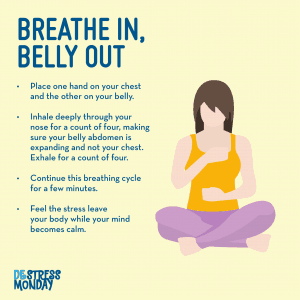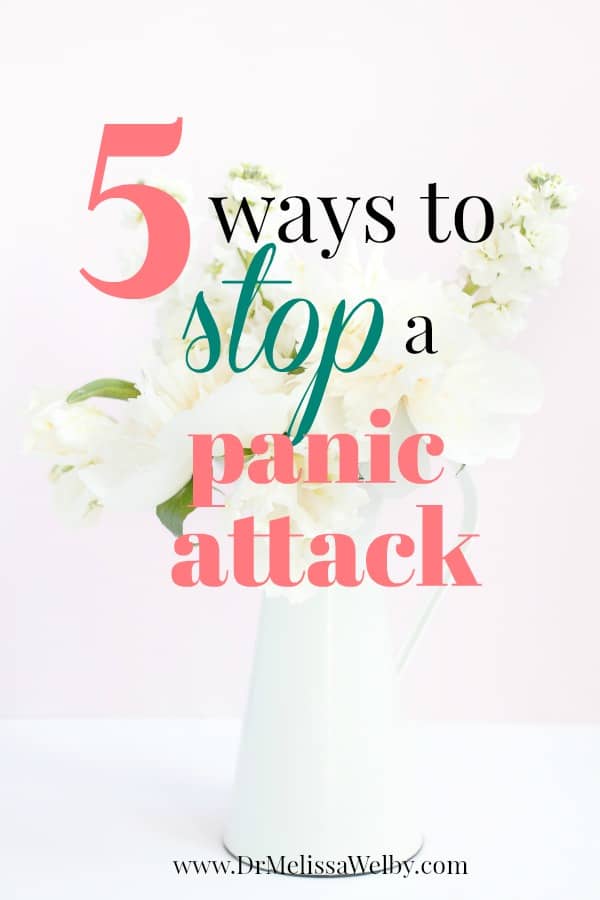Panic attacks can be terrifying and life-altering if they are not controlled! Often they are so scary that every detail of someone’s first attack becomes etched permanently in their mind. Are you wondering how to stop a panic attack? Let me tell you what to do during a panic attack so that you can learn how to control panic attacks instead of them controlling you.
Panic attacks cause a sudden intense fear when no danger is present or there is no identifiable trigger. This fear triggers your bodies emergency system to be activated causing the physical fight or flight reactions. Your body reacts as if you were under attack and fighting for your life.
Panic attacks can strike at any time and without warning. Because of this, people begin to fear when and where an attack could happen again. They no longer feel in control of their body and begin to limit what they do because of it. If this is allowed to continue, their world can keep getting smaller until they prefer not to leave the house.
Symptoms of a panic attack generally peak in a few minutes. They are usually brief but can last hours in some people. After they are over people feel exhausted as if they have just climbed a mountain or run a race.
For information on panic disorder check out this post by the NIMH. They include a patient description of their experience of panic disorder:
“One day, without any warning or reason, a feeling of terrible anxiety came crashing down on me. I felt like I couldn’t get enough air, no matter how hard I breathed. My heart was pounding out of my chest, and I thought I might die. I was sweating and felt dizzy. I felt like I had no control over these feelings and like I was drowning and couldn’t think straight.
“After what seemed like an eternity, my breathing slowed and I eventually let go of the fear and my racing thoughts, but I was totally drained and exhausted. These attacks started to occur every couple of weeks, and I thought I was losing my mind. My friend saw how I was struggling and told me to call my doctor for help.”
Common symptoms of a panic attack:
- Sense of impending doom or danger
- Fear of loss of control or death
- Rapid, pounding heart rate
- Sweating
- Trembling or shaking
- Shortness of breath or tightness in your throat
- Chills
- Hot flashes
- Nausea
- Abdominal cramping
- Chest pain
- Headache
- Dizziness, lightheadedness or faintness
- Numbness or tingling sensation
- Feeling of unreality or detachment
Ally is a mental health blogger from Germany who writes about her experiences with anxiety and depression on Allyeveryday. She blogs as a way to spread awareness and break down stigma.
This is how she describes a panic attack:
Panic feels like losing control. Everything seems like it is happening at once and at the same time, time stands still. My only thought is: “I have to get away!”. Everything is crashing down and I have 1 million thoughts and emotions rushing through my mind. I feel completely overwhelmed. There are no reasons, no explanations… just fear, and anxiety.
It feels like you are dying of anxiety- drowning and falling at the same time. I can’t breathe, my heart is racing, I’m shaking, and feel dizzy and sick. At the same time, I feel like I can’t move, can’t think straight, but can’t stop thinking either. I feel like I’m not in control of my brain anymore, and am losing power over my body. Panic slowly overtakes my mind and I feel in that moment there is nothing I can do but watch myself fall apart. It feels surreal, disconnected from the world, and the only thing that exists is you and your anxiety.
Afterwards, everything seems like a bad dream. I realize I got a panic attack over nothing and I, once more, let my anxiety take control. I feel weak and embarrassed for being scared out of my mind and not being able to stop it.
What NOT to do if you think you are about to have a panic attack:
People with anxiety can be oversensitive to normal bodily sensations. When panic starts, it will make it worse if you hyperfocus on things like your heart rate and breathing. Hyperfocusing fuels the panic attack so it continues to grow.
Here is an example of hyperfocus to make it easy to see how our thinking can propagate a panic attack:
“My heart is going fast. I wonder what’s happening! Am I having a heart attack? I do feel like my chest is getting tight. Am I having a panic attack? What if I pass out? I’m starting to feel a little dizzy! My hands are getting numb and I feel like I can’t breathe! What if I throw up? What if I’m dying?”
Instead of interrupting the anxiety and working to calm oneself, hyperfocus does the exact opposite. The more you focus on how fast your heart is beating the more anxious you will get and the faster it will beat. When anxious, people often tense their body and either hyperventilate or restrict breathing. The breathing changes can then cause the tingling in your limbs which further serve to convince you that you are having a heart attack. This snowball of physical sensation can keep going until you exhaust yourself and the panic passes.
What causes that tingly sensation during a panic attack?
During breathing, you breathe in oxygen (O2) and exhale carbon dioxide (CO2). If you breathe too fast or too slow you end up disrupting the balance between the amount of O2 and CO2 in your body. This leads to many of the physical sensations that happen during a panic attack.
Hyperventilation:
During hyperventilation, the body breathes out too much CO2. This causes changes in your body (blood pH rises causing respiratory alkalosis) which result in the symptoms of dizziness, tingling in your lips, hands and feet, headache, weakness, fainting, and seizures.
Hypoventilation:
Some people restrict their breathing during a panic attack by either holding their breath or by breathing in a short and shallow manner. Hypoventilation can also cause lightheadedness or dizziness. Restricting breathing leads to an increase of CO2 causing blood pH to fall and a respiratory acidosis.
5 Ways to Interrupt a Panic Attack:
1. Distraction!
If you are sitting on the couch watching tv and you start to feel the beginnings of a panic attack don’t continue to sit there and think about it.
Get up and do something else! Don’t remain in the same environment if you can change it.
- Go wash the dishes in another room.
- Grab the vacuum and vigorously clean.
- Call a friend and ask them how they are.
- Leave the house or the office to get some fresh air.
- Leave your desk and go splash water on your face.
- Walk quickly around the block (or from room to room) while counting how many steps it takes to get from point A to point B.
2. Breathe properly!
This is very important! If you control hyper- or hypoventilation, you can control the pins and needles sensation. Hyperventilation can cause the sensation of shortness of breath so people breathe deeper and then make the situation worse.
Inhale slowly through your nose by pushing your abdomen out for 5-7 seconds. Hold your breath for a few seconds and then exhale through your mouth slowly. It is important to make sure your abdomen is expanding and not just your chest.
3. Exercise!
When feeling panic it can be effective to match the intensity of the anxiety with physical exercise.
- Go outside and do some sprints,
- walk vigorously around the block,
- do 100 jumping jacks,
- or walk up and down the stairs until the feeling passes.
I find gentle exercise less effective because it is easier to still focus on how you are feeling while you are doing it. Intense exercise can make it difficult to think about anything else and therefore can be a very effective distraction.
Exercise can also help your muscles relax. When having anxiety and panic people often tense all their muscles leading to some of the feelings of chest discomfort.
4. Shift your focus:
Pick any item and study it intensely. Give yourself something objective to fixate on instead of focusing on your bodily sensations. Describe every detail of the item. When you finish one item move on to describe other items.
Here is an example of studying a plant:
- What are the leaves like?
- Does it have smooth edges?
- What is the color?
- Are some new leaves sprouting?
- What does it feel like when you touch different parts of it?
The exercise of shifting your focus can help bring you back to the moment and away from focusing on physical sensations.
5. Progressive muscle relaxation:
Progressive muscle relaxation is a great tool for panic because it is active and requires focus to complete. It is an exercise that can relax your mind and body through slowly tensing and then relaxing each muscle group.
Start at one end and work your way throughout your entire body.
- Tense your muscle as hard as you can and hold it for 5-10 seconds.
- Feel the sensation that happens as you are tightening the muscle.
- Once you relax, feel the muscles relaxing and the tension dissipating.
- Relax for 20-30 seconds before moving on to the next muscle group.
Next time you feel the start of a panic attack use these tools to interrupt it: distraction, breathing properly, exercise, shifting your focus, and progressive muscle relaxation. Don’t let anxiety and fear of a panic attack take control. The time spent fearing panic is never time well-spent. Anxiety and panic attacks are treatable so get help if you need it.
Are there other tools that help you? Let me know your thoughts in the comments!
Would you like to read more about anxiety?
Anxiety: The Best Websites, Books, and Apps to Treat it
Do what you are afraid of: Stop letting anxiety control you
Benzodiazepines: Do They Treat Anxiety?
Harley from The Balanced Belles wrote about the stories of 8 anxiety sufferers






Great tips and info. Will tuck this away for my next tight flight connection ?
Fortunately, I haven’t had a panic attack in YEARS, but this is super helpful information
Martha Beck’s book, Steering by Starlight, talks about how she had researchers hook her brain up to an MRI machine. She then went through everything she could think of to reduce her anxiety – meditation, deep breathing, etc. – and the ONLY thing that made any difference to the actual levels of anxiety in her brain was imagining the most stressful situations she could remember having experienced. Thinking about her panic at speaking in front of a crowd, for example, cut the measurable levels of anxiety in her brain. Most of us try to forget our panicky situations, but they might turn out to be our allies in the face of future anxiety!
Sounds like a great book! I think by facing and thinking about our fears it takes their power away. We take control back and therefore are less anxious. Thanks for your comments!
My daughter has these attacks, originating from the time she was in an abusive relationship. I will pass on these tips and send her the link to your blog as well. Although I don’t suffer them myself, there have been stressful times when I have felt like this. Thanks for sharing – I have on twitter as well.
I find the progressive muscle relaxation technique works really well for me.Especially if I can identify it before I get into a full-blown attack. thanks for all the other suggestions.
That’s great! I’m so glad that helps you. Thanks for sharing.
Panic attack sufferer here. They are awful!! But I know they are short so I use breathing and shifting my focus to help cope. Great tips.
I have only self diagnosed myself with panic attacks. I don’t know what else it can be. Mine last for hours and I always think I am going to die. I am just calming down now from an attack and I used your advice. It seems to have helped. It’s only been an hour and I am feeling calmer. Thank you.
Im so glad it could be helpful for you! Panic attacks are awful but can be overcome the more you practice interrupting them and work at recognizing the patterns early so they can be stopped before they progress.
Fantastic points all well made. As someone who experienced severe panic attacks and ptsd post violent attack. Understanding that this was a normal reaction to an awful situation was really helpful in understanding why my body was behaving in the wasy it was. Also knowing that I should be able to get through and the situation didnt have to stay the same. Then taking action and it working all helped me to believe that I could take controll and get my life back.
Thanks for sharing your experience and what was helpful to recover. It’s key that you realized you could take control and get your life back!
I noted all the tips you shared, this will come handy in the future and I hope this helps all the people suffering from the panic attack. Thanks!
Thank you for sharing your tips. I have a problem with a tight throat and I sometimes dry reach when I have a panic attack. The last one happened at the beauty salon when I was trying to get my legs waxed. It was very embarrassing and now I don’t like doing anything in case it happens again. I think that the breathing tips will help me a lot. Thank you.
Yes, if panic attacks are left unaddressed they can really limit what people are willing to go out and do. I’m glad you are looking at strategies to overcome them so they don’t take control of your choices!
Thank you for these tips. I have horrible panick attacks on planes in which the first three suggested steps for controlling these attacks are usually off limits or very limited. Especially because of the mask mandates, which I support, but it makes it very difficult to do breathing exercises. There was one very recently that I had to get off the plane and wasn’t allowed to board again. Can I skip the first three steps or do you have alternate suggestions for situations like on a plane?
I wrote a blog specifically addressing fear of flying and options for treatment. You are right, most people would not appreciate you doing burpees in the aisle to distract yourself or moving seats randomly. But there are things you can do and there are therapists that even specialize in CBT for flying phobia. Hopefully you find some of the resources listed in this next blog to be helpful https://drmelissawelby.com/adventure-awaits-how-to-overcome-fear-of-flying-phobia/